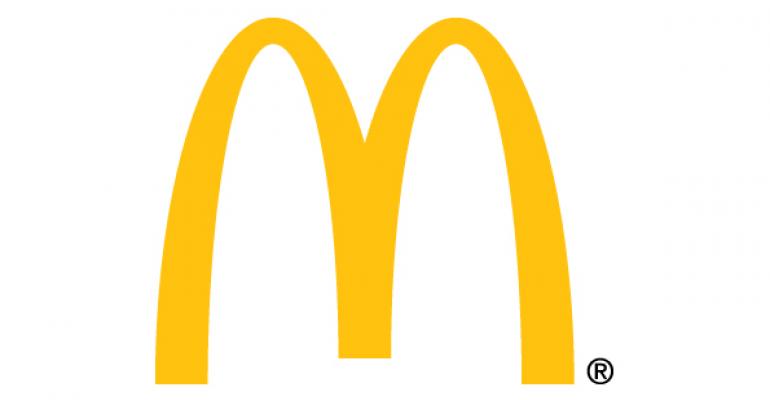A focus on value and discounting at McDonald's has left select number of franchisees feeling pessimistic about their chances at profitability, according to a recent quarterly study from Janney Capital Markets.
For a report from analyst Mark Kalinowski released before Oak Brook, Ill.-based McDonald’s Corp. reports first-quarter earnings, Janney surveyed 25 domestic franchisees representing about 180 locations. Those franchisees expect same-store sales to swing positive in the first quarter with an aggregate projected increase of 0.3 percent in March and 1.7 percent in April.
RELATED
• McDonald's fish certified as sustainable
• McDonald's expands chicken wing test to Chicago
• More quick-service news
However, when surveyed about the level of McDonald’s discounting, the franchisees expressed concern that too many menu items are advertised and sold at steeply discounted prices, leaving operators with fewer chances to sell full-margin items that drive profitability. The operators’ average response
When asked to rate the level of discounting in 2013 on a 1-to-10 scale in which a rating of 5 represented the historical average level and 10 represented the highest level possible, the operators' gave an average response of 8.32.
Frustration over discounting has kept the franchisor-franchisee relationship strained, according to the results of the operator survey. When asked to rate that relationship on a 1-to-5 scale, with 1 meaning “poor” and 5 meaning “excellent,” the franchisees produced an average response of 1.93. Kalinowski noted that the result was an improvement from 1.76 in the pre-fourth-quarter survey, yet it was below the survey’s historical range between 2.1 and 2.2.
The owner-operators also rated their outlook for the next six months of business as only mediocre, with an average rating on a five-point scale of 2.4, or between “good” and “fair.” That was slightly better than the 2.38 rating given in the prior quarter, but well below the survey’s historical average of 3.0.
McDonald’s Corp. customarily does not comment on Janney’s franchisee survey, as the results are typically published during the company’s “quiet period” before earnings are announced. However, spokespeople have noted before that the survey represents a small portion of the company's domestic system, which comprises more than 2,500 owner-operators and more than 14,000 restaurants.
Paying at margins for discounts
The franchisees’ outlook for slightly positive same-store sales follows a difficult seven-month period for McDonald’s domestic comparable sales. Domestic same-store sales fell 3.3 percent in February — though they would have been flat if not for a calendar shift, McDonald’s said — while lapping an 11.1-percent increase from a year earlier, which was the brand’s most difficult comparison from an unseasonably warm winter of 2012.
The brand’s big limited-time promotion during February was Fish McBites, which gave way to the launch of the Premium McWrap in March. But in comments to Janney’s survey managers, McDonald's franchisees expressed frustration that those items have steep introductory discounts before being sold for full price. They also noted that the rest of the menu carries prices that trade too much traffic for too little profit, like the Dollar Menu and $1 beverage promotions.
“The economy is still coming back,” one respondent said. “The corporation wants so much discounting. When is the cash flow coming up?”
Franchisees had approved at the end of 2012 through the McDonald’s Operators National Advertising Fund, or OPNAD, to add more $1 items to the menu, such as the Grilled Onion Cheddar Burger and snack-size Fish McBites. However, they took a stand against the company's proposal to sell hamburgers and cheeseburgers for 69 cents and 89 cents, respectively.
According to another comment in the survey, OPNAD also voted against a suggested $1 price point during an introductory period for the McWrap. Commenting on the item itself, one franchisee said McWraps are “great, but in large numbers are an operational nightmare and [cause] slow service.”
'Obamacare' an additional strain
Several operators said the strain on their profit margins resulting from the menu comes at a time when other costs mandated by the franchisor or the government — specifically the Patient Protection and Affordable Care Act, or “Obamacare” — already threaten their bottom line.
“Obamacare is going to destroy already low profits,” one franchisee said. “McDonald’s Corp. does not seem to care. The corporation is frantically trying to increase the number of 24-hour stores regardless of lack of profitability. Add rising commodity and insurance costs and McDonald’s drive to get operators to rebuild or remodel, and the future looks bleak.”
Another operator agreed that “the relationship is a negative number,” characterizing initiatives like the systemwide reimaging of the past few years as a way to drive top-line sales and shareholder value with little regard to franchisees’ ability to make a profit.
“The most recent and biggest coup for the company has been to get franchisees to bankroll new building on company property at their expense,” the commenter said. “Then, when that same franchisee can’t meet the debt ratio expectation, they find themselves in a business review being told they aren’t up for rewrite or further expansion. Debt [is] created by the corporation and now used as a tool to further their control.”
McDonald’s has more than 34,000 restaurants, 80 percent of which are franchised, in 119 countries.
Contact Mark Brandau at [email protected]
Follow him on Twitter: @Mark_from_NRN





